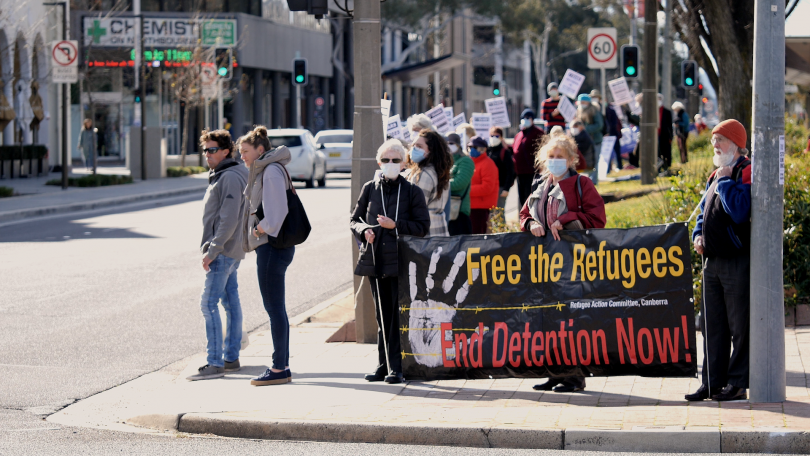
Canberra Refugee Action Campaign protestors in 2020 demanded an end to indefinite detention for refugees and asylum seekers. Photo: Region.
Commonwealth Ombudsman Iain Anderson has urged the Department of Home Affairs to find better ways to treat asylum seekers facing a long time in detention.
Immigration detention camps are not designed for holding people for extended periods, he said, adding that he welcomed news from the department that it is currently investigating alternatives.
In his annual report monitoring places of detention, the Ombudsman also expresses concern over increases in the time people are being held in immigration detention centres.
The average number of days asylum seekers spent in detention centres jumped by more than half (53 per cent) between 2019 and 2022, from 485 days to 742 days.
“There remains a high number of people held in immigration detention,” Mr Anderson said.
“This includes individuals facing apparent indefinite detention, such as those who engage Australia’s protection obligations and cannot be involuntarily removed.
“I have recommended the Department of Home Affairs work with relevant ministers to consider alternative arrangements for individuals facing prolonged or indefinite detention.”
His report states that detention centres were not built for long-term stays and lacked purposeful activity, with many detainees saying they would rather be in jail with a known date of release.
The department’s response to the coronavirus pandemic was another focus, with the report recommending that family visits should be allowed from unvaccinated people.
“We acknowledge there is a balance between limiting exposure to COVID-19 and meeting the needs of people in detention,” the report states.
“However, not allowing visits from unvaccinated people, particularly family members, gives rise to situations where individuals may not have seen their family or support system for a significant period of time.”
The department has responded saying facility-level decisions to modify any arrangements for family visits are managed on a case-by-case basis.
The Annual Report of the Commonwealth National Preventive Mechanism under the Optional Protocol to the Convention Against Torture (OPCAT) is unique as it specifically looks at the treatment of people held in various forms of detention.
In its overview, the report explains that National Preventive Mechanisms are independent visiting bodies established to examine the treatment of persons deprived of their liberty, with a view to strengthening their protection against torture and other cruel, inhuman, or degrading treatment or punishment.
“An NPM is not an investigative body,” it states.
“The mandate of an NPM differs from other bodies working against torture in its preventive approach: it seeks to identify patterns and detect systemic risks of torture, rather than investigating or adjudicating complaints concerning torture or ill-treatment.”
The report makes 18 recommendations, of which the Department of Home Affairs agreed with 13, disagreed with two, and noted three.
















